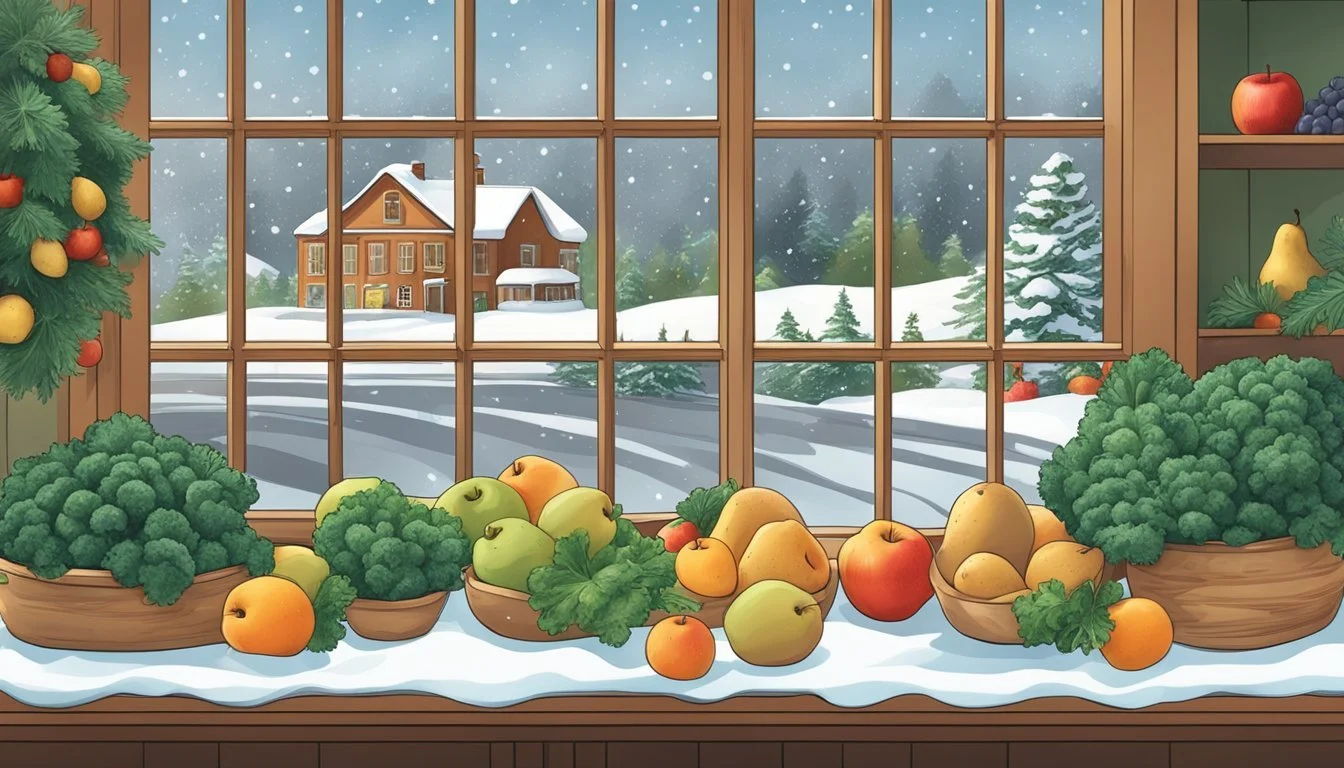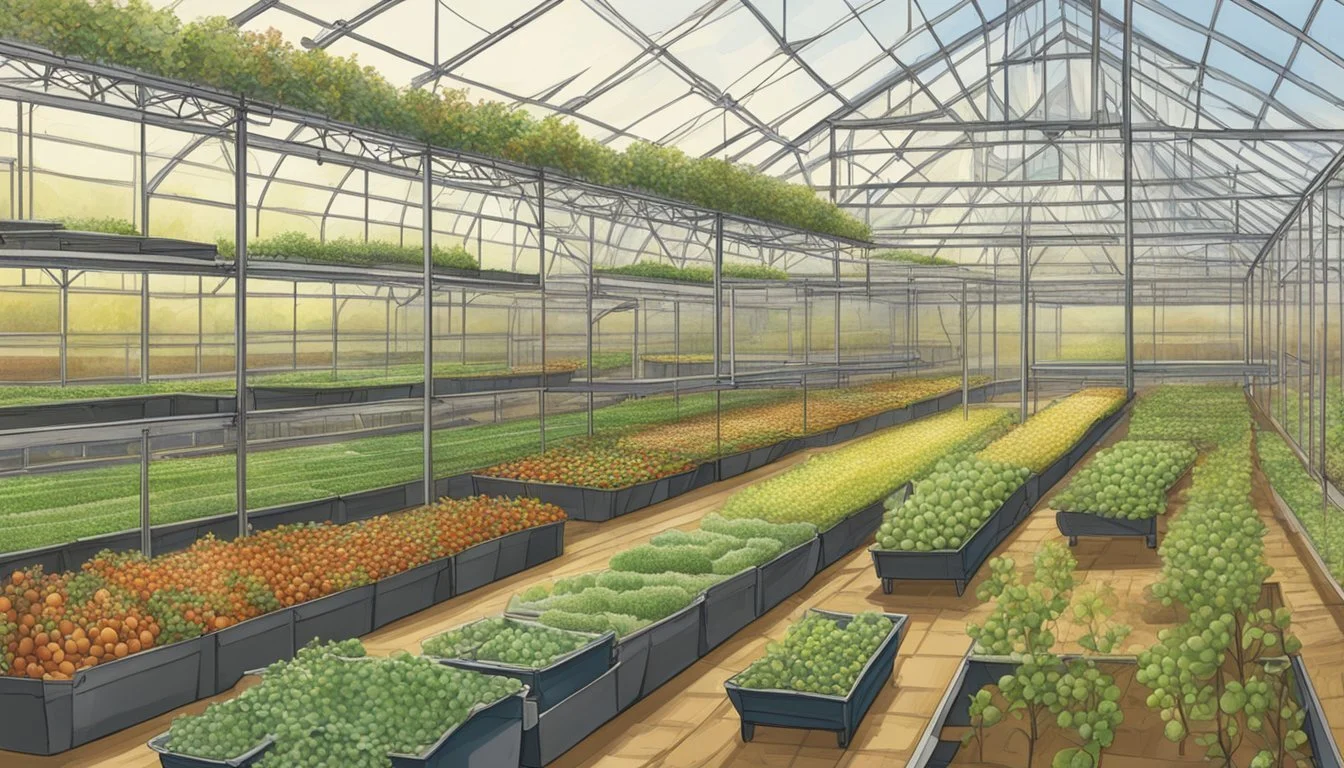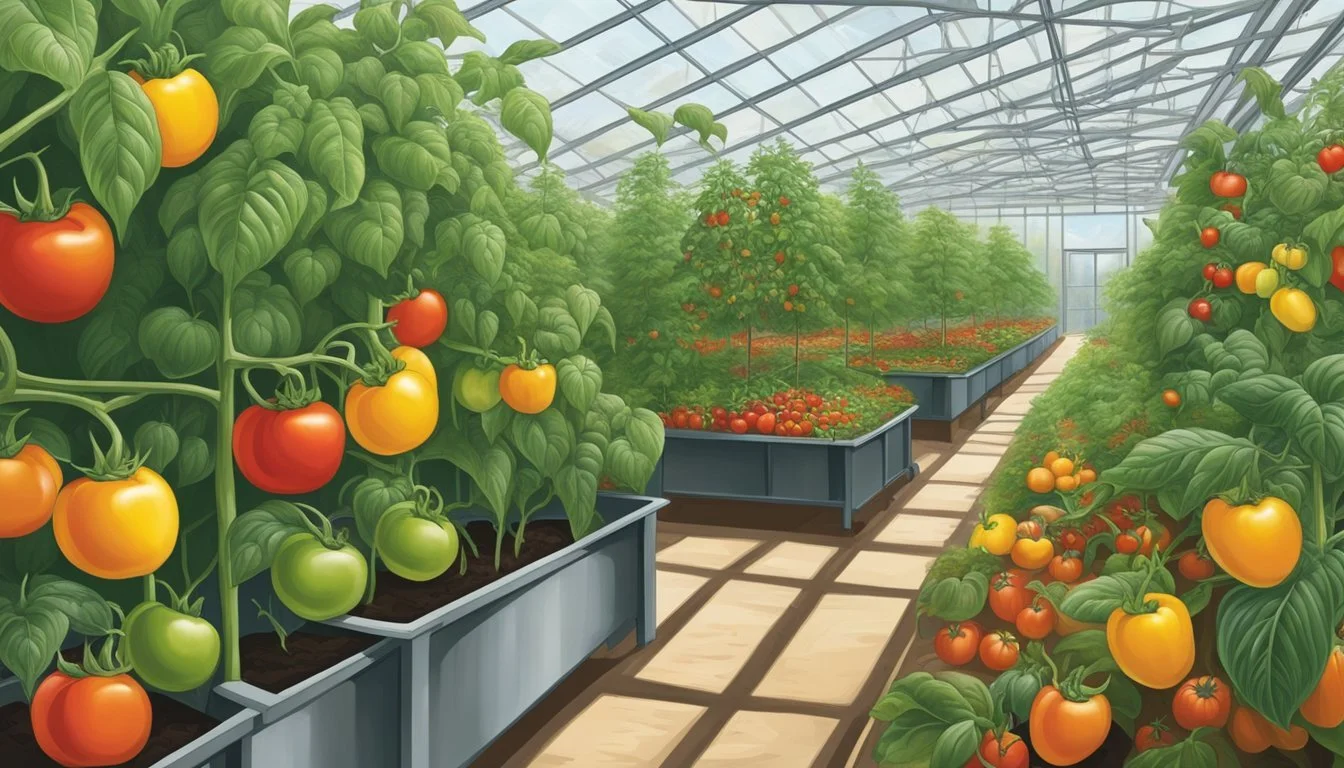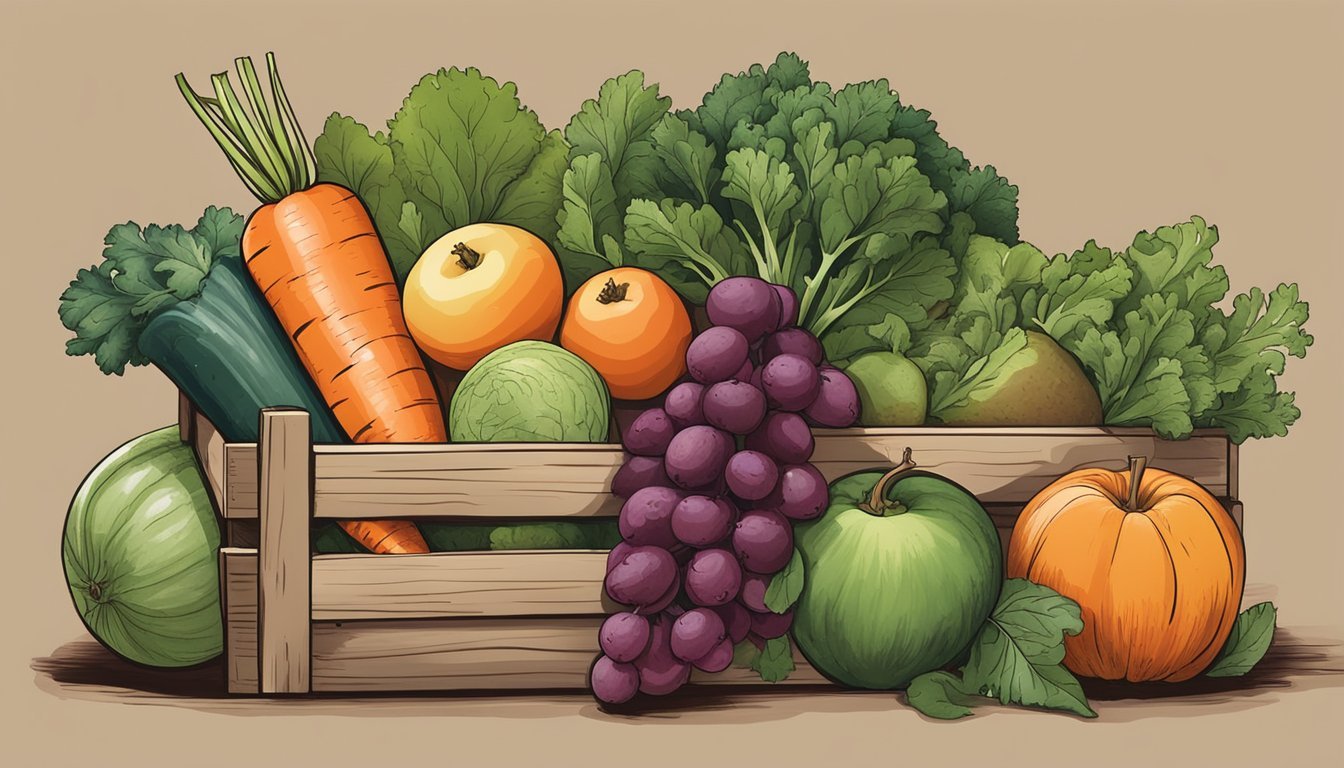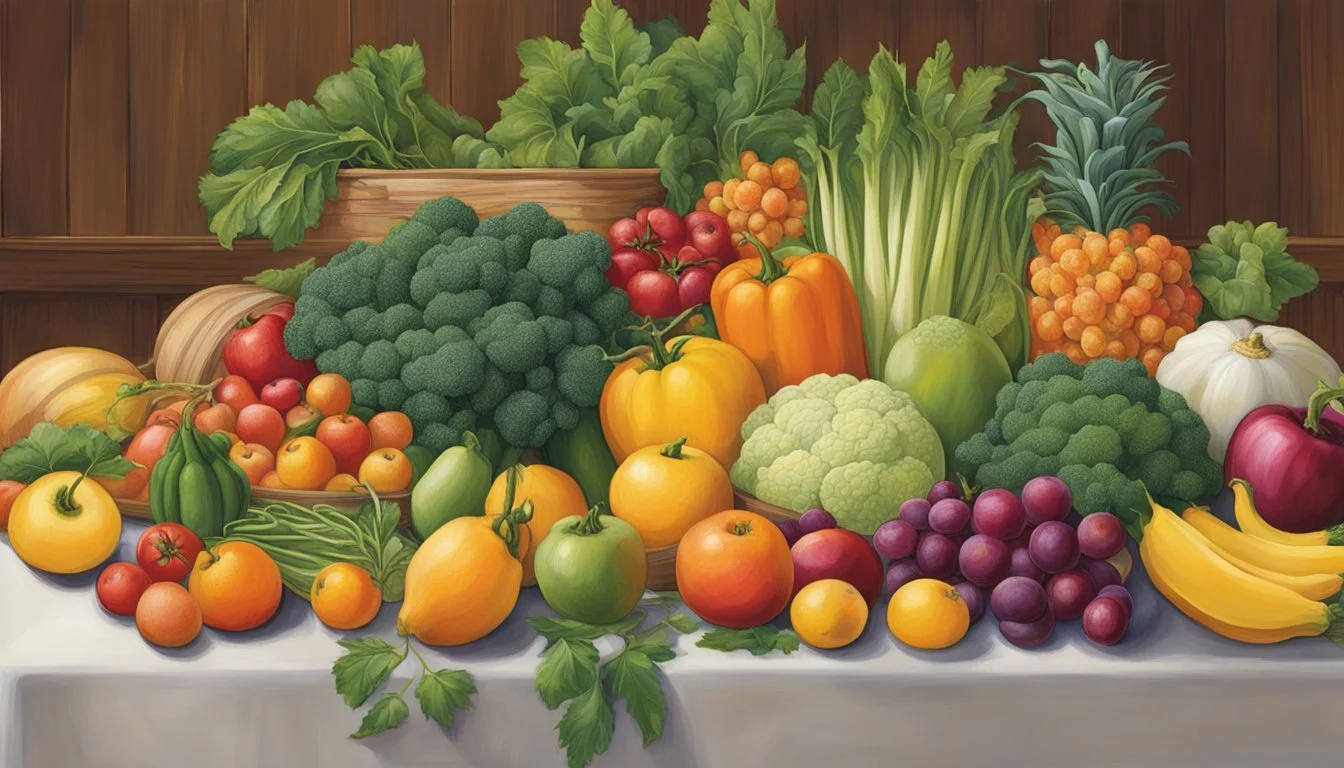New Jersey Seasonal Fruit & Vegetables in February
Your Guide to Local Produce
This Article is Part of our New Jersey Seasonal Fruit & Veg Calendar
February in New Jersey may be chilly, but it's a time when certain produce items are at their peak, offering crisp flavors and a bounty of nutrients. This winter month doesn't boast the same variety as the summer or fall harvests, yet there are still fruits and vegetables that thrive in the cooler temperatures. Shoppers and chefs alike value this season for the fruits and vegetables that can withstand the frost, providing fresh options that are both nutritious and flavorful.
Root vegetables and hearty greens typically dominate New Jersey's seasonal offerings in February. These crops are capable of surviving the harsher conditions and are often harvested during the winter months. Residents can expect to find a selection of produce such as carrots, potatoes, and onions, which are staples for warming winter meals. In addition to these, leafy greens like kale (What wine goes well with kale?) can be found fresh during this time, known for their versatility in dishes ranging from salads to sautés.
While the fruit selection is more limited during this period, February still provides certain sweet and citrusy options to brighten up the winter palate. Apples (how long do apples last?), which are stored well beyond their picking season, remain a crisp and juicy choice. Meanwhile, citrus fruits like clementines, lemons, and grapefruits reach their peak and offer a burst of flavor and vitamin C, much needed during the colder months. These fruits are ideal for both snacking and cooking, and they play an important role in the seasonal culinary landscape of New Jersey.
Overview of New Jersey's Farming Calendar
New Jersey's climate is primarily humid subtropical which delineates a farming calendar that varies by season. February places farmers in a quiet period as the state endures cold temperatures and limited outdoor crop growth. This month is characterized more by planning and preparation rather than harvesting.
Winter:
Months: December to February
Typical Activities: Winter in New Jersey typically sees farmers preparing fields, ordering seeds, (how long do seeds last?) and planning for the spring planting season. Some hearty vegetables, like winter squash, may still be available from fall harvests.
Spring:
Months: March to May
Crops: Spring marks the beginning of the planting season, with early seedlings for crops like lettuce and peas getting started in greenhouses or cold frames.
Summer:
Months: June to August
Crops: The peak season for many of New Jersey's most famous produce, such as tomatoes, sweet corn, zucchini, and blueberries, which thrive in the warm summer months.
Fall:
Months: September to November
Crops: Autumn brings a rich harvest including apples, pumpkins, and late-season vegetables like kale and broccoli.
While February is not a peak harvest month, farmers may still offer produce stored from fall or grown in greenhouses. Cold-hardy crops or those utilizing protective measures may also be available. In this month, consumers can expect stored root vegetables and some greenhouse-grown produce at local markets. The anticipation in February is palpable as farmers ready for the imminent spring season.
Seasonal Crops in February
In February, the heart of New Jersey's winter season, a select group of vegetables braves the chilly temperatures. Farmers and gardeners harvest crops that are resilient to frost and cold weather.
Vegetables:
Lettuce varieties such as Butterhead, Boston, and Loose Leaf are hardy options that can withstand frost and even snow.
Spinach is another cold-tolerant leafy green, offering nutritional benefits and versatility in the kitchen.
Root vegetables like carrots and parsnips continue to be harvested, as the cold ground preserves their freshness.
Fruits: New Jersey's February fruit selection is more limited due to the cold climate. However, stored apples and pears from the late fall harvest remain available and of good quality.
Planning and Preparation: While the harvest is modest, February is a critical time for planning. Gardeners begin starting seeds indoors for crops such as tomatoes and peppers, anticipating the warmer days of spring.
In conclusion, while February in New Jersey presents obvious challenges for agriculture, it still yields a variety of cold-hardy crops, and sets the stage for the coming abundance of spring and summer harvests.
Winter Fruits and Vegetables
New Jersey's winter bounty includes a variety of root vegetables and leafy greens that can withstand the cold climate, providing fresh produce options throughout the season.
Root Vegetables
In February, root vegetables are a cornerstone of New Jersey's agricultural output. These hardy selections thrive in colder temperatures, and their storage capability makes them a staple in winter diets.
Potatoes: A versatile vegetable that comes in different varieties such as Idaho (baking), wax, and Yukon Gold.
Turnips: These can be used in a variety of dishes, from roasted sides to flavorful additions to stews and soups.
Onions: A fundamental flavor component in many recipes, onions are available throughout the winter.
Leafy Greens
Leafy greens are surprisingly resilient in colder weather, and some types even benefit from a touch of frost, which can enhance their flavors.
Kale: Highly nutritious, kale is a popular leafy green that becomes sweeter after a frost.
Spinach: This versatile green is packed with vitamins and can be used in salads, sautéed, or as an addition to warm dishes.
Lettuce: Various types of lettuce, including Romaine and green or red leaf, are often grown in colder months and are perfect for winter salads.
Fruit Availability in Winter
In February, New Jersey offers a modest variety of fruits, primarily through cold storage and the continuation of the citrus season.
Citrus Fruits
New Jersey markets in February see a range of citrus fruits that are in season. This category includes:
Blood oranges: Known for their vibrant color and distinctive flavor, blood oranges are a winter citrus variety that add a splash of color to the produce selection.
Clementines: These small, sweet citrus fruits are typically seedless and easy to peel, making them a convenient snack.
Stored Produce
While many fruits are out of season, stores and markets still provide varieties that have been kept in cold storage. These fruits maintain their quality and flavor well beyond their harvest time. Here is what one can typically find:
Apples: A diverse selection of apples can be found, from crisp and tart to sweet and juicy. They are versatile for raw and cooked applications.
Pears: Another fruit that stores well, pears continue to be available, offering a buttery and subtly sweet addition to winter fruit options.
Greenhouse Grown Produce
New Jersey's greenhouse operators employ advanced technology to ensure a year-round supply of certain vegetables. During the colder months of February, when outdoor farming is less viable due to frost and snow, greenhouses in the state offer a solution for consistent production.
Tomatoes, cucumbers, and various types of peppers are among the primary greenhouse-grown vegetables. They rely on controlled environments to thrive, regardless of the weather outside.
Detailed Greenhouse Vegetables:
Tomatoes: Growers maintain optimal conditions in greenhouses, giving tomatoes the warmth and protection they need for continued harvest.
Cucumbers: These typically require similar conditions as tomatoes, with various available hybrids well-suited for greenhouse production.
Peppers: Both sweet and hot varieties are grown in these controlled settings. The temperature and humidity levels in greenhouses are carefully regulated to meet the peppers' specific needs.
The practice not only extends the growing season but also increases yields and product quality. It addresses the local demand for fresh produce during months where traditionally, options would be limited.
Consumers benefit from New Jersey's capability to provide these fresh, locally grown vegetables, which are not only fresher but also can be more sustainable due to reduced transportation requirements compared to importing produce from far distances.
Local Food Distribution
In New Jersey, the month of February presents limited options for fresh local produce due to the winter season; however, food distribution networks are active and ensure a supply of seasonal items to stores and markets. They rely on both regional food distribution programs and partnerships with farms to stock shelves with available fresh fruits and vegetables.
Stores and Markets: Most retail stores procure their produce from larger distribution centers, which coordinate with local farms to supply seasonal items. Consumers can find a selection of winter produce such as apples and root vegetables sourced from within the state.
Farm Contributions: Local farms play a crucial role in distributing their produce through various channels including farm-to-table operations, farmers' markets, and Community-Supported Agriculture (CSA) programs. While the variety is constrained in February, greenhouse-grown items like herbs and selected greens might still be available.
DoD Fresh Program: The Defense Logistics Agency, partnering with the USDA, facilitates the DoD Fresh Fruit and Vegetable Program in New Jersey, offering a pathway for schools to receive fresh produce. This initiative underscores the commitment to ensuring that even during the leaner months, institutions have access to quality fruits and vegetables.
Seasonal Availability: Below is a snapshot of typical produce that may be distributed during New Jersey's winter:
Apples
Beets
Brussels sprouts (how long do brussels sprouts last?)
Cabbage
Carrots
Onions
Potatoes
Sweet potatoes
Winter squash
These fruits and vegetables are often available at local grocery stores, and are indicative of the region's winter agricultural output.
Benefits of Eating Seasonally
Eating seasonally offers a variety of benefits that extend from personal health to environmental sustainability. When individuals choose seasonal fruits and vegetables, they often enjoy produce that is at its peak in both flavor and nutrition. Seasonal foods are harvested at their prime, meaning they have developed their fullest natural taste and nutrients, without the need for artificial ripening.
Health Advantages:
Nutritional Value: Seasonal produce is fresher and tends to be more nutrient-dense.
Variety in Diet: Eating seasonally introduces a diverse array of fruits and vegetables into one's diet, providing a wider range of vitamins, minerals, and antioxidants.
Environmental Impact:
Reduced Carbon Footprint: Local in-season produce doesn't require long-distance transportation.
Support for Local Farms: Choosing seasonal items supports local agriculture and reduces dependence on imported goods.
Culinary Experience:
Seasonal recipes often highlight the natural flavors of the produce, requiring fewer additional ingredients.
In-season fruits like winter squash can become the centerpiece of meals, offering opportunities for creative and healthy recipes.
For February in New Jersey, while fresh local produce may be limited, there are options like stored apples or hearty root vegetables that can still provide health benefits and inspire seasonal cooking. Consumers may find these items in local markets, ensuring they get the freshest possible ingredients for their winter recipes.
Preparing Seasonal Produce
In February, New Jersey's seasonal produce includes a variety of root vegetables and robust citrus fruits, which are excellent for creating comforting soups, refreshing salads, and delightful desserts.
Cooking Winter Vegetables
Root vegetables such as turnips, sweet potatoes, and carrots are abundant in February and lend themselves well to hearty soups and stews. One can roast these vegetables to enhance their natural sweetness, which pairs perfectly with earthy herbs like rosemary and thyme. The high starch content of these winter offerings means they do an excellent job of thickening soups and providing a satisfying texture.
Making Winter Salads
Salads in winter can be just as exciting as summer ones with the right produce. One can combine bitter greens like kale with sweet and tart elements from fruits such as grapefruits or oranges. Adding roasted nuts (how long do nuts last?) or seeds to a winter salad introduces a welcome crunch and extra nutrition. Dress it with a simple vinaigrette made from citrus juice, olive oil, and a hint of honey to complement the flavors of the salad.
Winter Fruit Desserts
Citrus fruits peak during the cooler months, presenting an opportunity to create vibrant desserts. Foods like lemons, oranges, and grapefruits can be the cornerstone of various recipes, from a lemon pound cake to a blood orange sorbet. One can also poach pears in spiced wine for a warm treat or bake apples with cinnamon and nutmeg (how long does nutmeg last?) to highlight the season's comfort.
Jersey Farm-to-Table Recipes
In the chill of February, New Jersey chefs and home cooks turn to locally stored and winter-ripe produce to craft farm-to-table recipes that showcase the state's agricultural offerings. While the summer's bounty is preserved or stored, recipes pivot to utilize hearty root vegetables and the celebrated Jersey tomato, often canned or jarred at peak freshness.
Hearty Soups and Stews
New Jersey's winter kitchens often feature robust soups and stews. A classic is the Tomato Basil Soup, concentrating the rich flavors of preserved Jersey tomatoes, and serving as a warm respite from winter chills.
Ingredients:
Canned New Jersey tomatoes
Vegetable broth (how long does vegetable broth last?)
Cream (optional)
Savory Sides
Root vegetables take center stage in side dishes. Beets, carrots, and potatoes are roasted, sautéd, or mashed. Recipes such as Rosemary Roasted Root Vegetables bring out the sweetness and earthy flavors iconic to the locally grown produce.
Ingredients:
Assorted New Jersey root vegetables
Olive oil
Salt and pepper
Preserved Delights
Home preservation allows summer fruits to play a role in New Jersey's winter feasts. Dishes like Blueberry Chutney incorporate the summer berries in a savory condiment that pairs wonderfully with roasted meats.
Ingredients:
Preserved New Jersey blueberries
Vinegar
Sugar
Spices
In-season ingredients may be limited, but New Jersey's February farm-to-table fare excels in delivering comforting and flavorful meals. It remains a testament to the state's rich agricultural heritage and the ingenuity of its residents to create dishes that are both delectable and seasonally appropriate.
Planning Your Garden
In New Jersey, February marks a period of preparation for the spring planting season. Gardeners should focus on starting seeds indoors and maintaining any winter crops.
Starting Seeds Indoors
Gardeners can take advantage of February's end-of-winter days to start seeds indoors. This head start is crucial for vegetables that require a longer growing season. Plants like tomatoes, peppers, and eggplants benefit from this early sowing, ensuring they are robust enough to transplant after the last frost. Key steps include:
Selecting appropriate containers: Small pots or trays with drainage holes.
Choosing a quality seed starting mix: It should be fine-textured and nutrient-rich.
Providing sufficient light: A sunny window or grow lights will encourage strong growth.
Keeping soil moist: Consistent moisture is critical for seedling development.
Winter Crop Maintenance
Maintaining winter crops still in the garden is another important task in February. Crops such as kale, collards, and Brussels sprouts may still be thriving, and with proper care, they can continue to produce until spring. Essential maintenance tips include:
Protecting plants from extreme cold: Utilize row covers or cold frames during freezing temperatures.
Monitoring for pests and diseases: Early detection and control can prevent widespread damage.
Pruning where necessary: Remove any dead or diseased foliage to encourage new growth.

